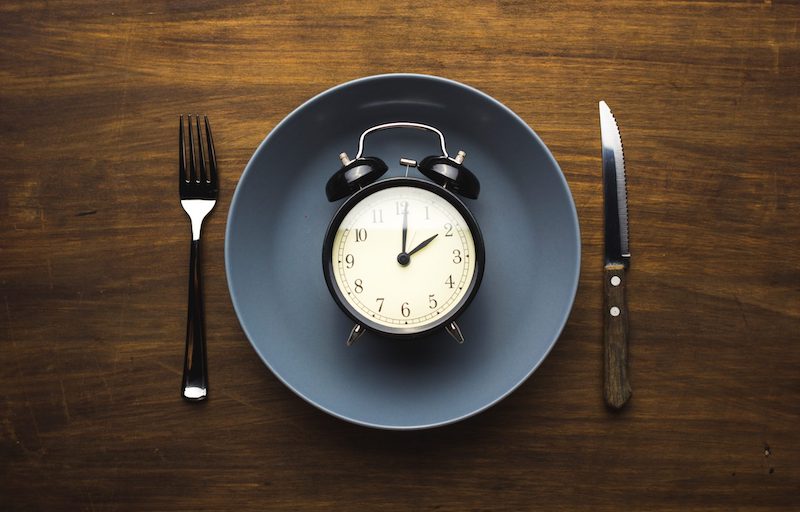11 Things to Know About Intermittent Fasting

April 10, 2019
By Brianna McCabe
Have you ever been so determined to lose weight, you decided to channel your inner Rocky Balboa?
Perhaps you purchased a sweatband online to soak up the puddles pouring off your forehead as you run up the stair climber at a rate of 8 mph blasting “Eye of the Tiger” on repeat, trying to figure out just how many times this sweat-inducing song can loop throughout your 30-minute mission. (For anyone wondering, it’s roughly 8 repeats for the single version.)
But let’s face it—we aren’t all going to be chiseled like Rocky, nor do we have the time for a regimen to attain such a feat.
Don’t be disappointed just yet… there are ways to effectively and naturally shed some pounds in a healthy, sustainable way.
According to Hackensack Meridian Health Medical Group physicians Kimberly Cai, M.D., and Nitin Patel, M.D., one method of achieving weight loss in a shorter timeframe is intermittent fasting.
“Intermittent fasting is a pattern of eating where you withhold food for a certain amount of time and allow your body to use energy more efficiently,” explains Dr. Patel, who has fasted in the past. “Instead of using energy from intake, such as carbs, you are breaking down fats.”
Before committing to intermittent fasting, both Dr. Cai and Dr. Patel recommend that an individual is aware of the following facts:
- There are different methods of fasting, with some of the most popular variations being:
- The 5-2 fast, where an individual consumes his or her normal caloric intake five days a week, and then two non-consecutive days the person limits consumption to under 500 or 600 calories.
- The 24-hour fast, where an individual fasts for a complete day either once or twice a week. The other days of the week, an individual eats within his or her normal caloric requirements.
- The time-restrictive fast, where you limit the times each day you can eat. “You usually give yourself a 6-8 hour window each day to eat within your normal caloric requirements and then fast the rest of the day,” says Dr. Cai.
- The alternate-day fast, where every other day an individual eats ¼ of his or her usual calories.
-
There’s a science behind the weight loss properties of fasting. To lose weight, our bodies need to increase the amount of time spent burning food energy. When you fast, you allow your body to burn stored energy. “The body is in the fed state when it is digesting and absorbing food, which starts when you begin eating and lasts 3-5 hours,” explains Dr. Cai. “During this time it is almost impossible for the body to burn fat as insulin levels are high.”
The post-absorptive state, on the other hand, lasts 8-12 hours after your last meal—which is when you enter the fasted state. “This is when your body burns fat as insulin levels are low,” adds Dr. Cai. “Essentially, fasting puts your body in a fat burning state that you rarely make it to during a normal eating schedule.”
- You can drink during periods of fasting, as long as it is a zero-calorie beverage. “A lot of people forget to drink water throughout the day,” shares Dr. Patel, “and people can quickly become dehydrated.” Coffees and teas, which are generally known as being appetite suppressing, are encouraged as long as nothing is added, such as creamers or sweeteners.
- Fasting somewhat debunks the idea that ‘breakfast is the most important meal of the day.’ According to Dr. Cai, current research is uncertain of the health benefits of skipping breakfast versus consuming breakfast in regards to obesity. “However, generally speaking it is better to eat earlier in the day and avoid eating right before you go to sleep as the body is less efficient in utilizing sugar as the day goes by,” clarifies Dr. Cai. If an individual wants to pursue a time-restrictive fast, it’s recommended to start eating at a time that, once eight hours are added, you still have a 5-6 hour span of fasting before sleeping. (For instance, if you tend to fall asleep at midnight, you would ideally want your last meal to be consumed at around 6 or 7 p.m.)
- There are other health benefits of fasting in addition to weight loss, including improved hormones, enhanced insulin resistance, decreased inflammation and increased anti-aging. “However, it is important to note that studies have not shown ‘better’ or ‘more’ health benefits in individuals who fast compared to those who follow a calorie-restrictive diet,” says Dr. Patel.
- If you’re looking to start fasting, you should start by eating foods high in fiber, such as nuts, beans, fruits and vegetables, as well as foods that are high in protein, such as meats, fish and tofu. “Anyone who wants to try intermittent fasting should talk to his or her primary care doctor,” explains Dr. Patel.
- Certain individuals should avoid fasting, including those who are over the age of 65-years-old, those under the age of 18-years-old (the body is still developing), diabetics (need glucose control), women who are pregnant or lactating (need the extra calorie requirements), anyone with a body mass index of below 18 or 19, cancer patients and anyone with an immunodeficiency. Dr. Cai adds, “Also, anyone with a history of having an eating disorder should avoid fasting.”
- You can work out while fasting. “Generally, people report feeling more energetic on fasting days,” shares Dr. Cai. She advises exercising before eating, as the body tends to get hungry 30 minutes to 1 hour post-workout. “If you are doing alternate day fasting and exercising on the 500-600 calorie day, save your food for after the exercise,” she adds.
- There are potential side effects of fasting. “Some studies have shown that people tend to overeat and binge,” claims Dr. Patel. “You can’t fast for two days and then eat 3,000 calories a day for the other five days. You have to eat healthy foods and meals within your caloric limit.”
- If you find that your hunger is of concern, don’t be afraid to break the fast. “Listen to your body,” cautions Dr. Cai. “If you find yourself getting light-headed, shaky or low-energy from not eating enough, grab some healthy food.”
- Intermittent fasting may not be sustainable in the long-run. “There is a higher drop-out rate among intermittent fasters versus those on a calorie-restrictive diet, which suggests that fasting may not be a sustainable approach,” says Dr. Cai. “It’s a quick way to lose weight, but you can’t really do this for more than a few weeks.”
“The idea of fasting reverts back to our roots if you think about it,” says Dr. Patel. “The whole idea that people need three meals a day with snacks in-between came about in the last few decades—the epidemic of obesity came about then, too.”
If you are looking to get a better handle on your hunger and lose weight faster than with a regular restriction, Dr. Patel recommends intermittent fasting.
“Cutting calories through any type of ‘dieting’ is the main factor behind weight loss,” Dr. Patel adds. “Find what works for you.”
Next Steps and Resources:
- Meet our clinical contributors: Kimberly Cai, M.D., and Nitin Patel, M.D.
- To make an appointment with Drs. Cai and Patel or another provider, call 800-822-8905 or visit our website.
The material provided through HealthU is intended to be used as general information only and should not replace the advice of your physician. Always consult your physician for individual care.
Find a doctor near me
How to Avoid Overeating While Working from Home

Avoid overeating while working from home? Learn healthy eating tips for better work-from-home nutrition. Improve your diet today!
Are Cleanses Safe?

Learn about cleanse safety. Registered dietitian James Montgomery explains potential risks and benefits. Prioritize your health with safe, effective strategies.
Find a doctor near me

5 Vitamins and Minerals Women Need—and How to Get Them
Vitamins and minerals are important in any diet to ensure proper bodily function. However, women’s bodies can experience changes over time, and certain vitamins and minerals become more critical to maintain good health.

Are You Addicted to Food?
Food addiction help. Drs. Afzal & Strom offer guidance on recognizing and addressing food addiction & overeating. Learn more & find support.

Try These Mood-boosting Foods
Boost your mood naturally! Discover mood-boosting foods like dark chocolate and leafy greens. Improve your well-being with these simple tips. Learn more today.
Heart-Healthy Labels: Are These Foods Really Good for Your Heart?
When you walk down your supermarket aisles or shop for groceries online, it’s common to see labels claiming that certain food products are healthy for your heart. But are they really good for you? Learn more.
